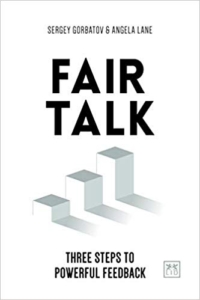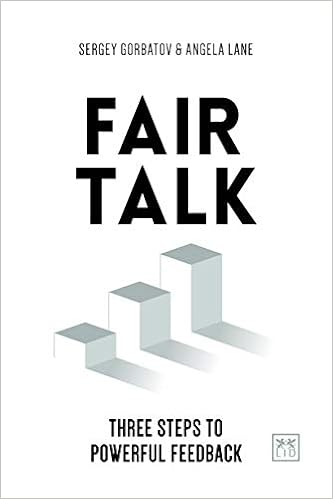![]()
October 21
Are you good
at
GIVING FEEDBACK
to your boss?
8 Pacific; 10 Central; 11 ET; 12 Rio/SP; 4 UK/Dublin; 5 CET; 6 TelAviv,Riyadh,Turkey,Helsinki,Moscow;
7 Dubai; 20:30 India; 2300 Shanghai,Singapore,HK
Zoom https://us02web.zoom.us/j/81456810100?pwd=MXhLTVpQMjJwTU9lK042Y01vRE44UT09 Pass 276397
BEST PRACTICE: Reserve your place in advance so we can plan well for business intros, speaking roles, time management. Thank you for your kind consideration. Contact publisher@globalbusiness.media confirmation sent to you in advance of the broadcast.
 AND…
AND…
LEARN
THE
REAL REASON
WOMEN
AREN’T
ADVANCING
By Angela Lane and Sergey Gorbatov

Women continue to be underrepresented at senior levels in the workplace. Catalyst, a global nonprofit organization supporting the advancement of women in the workplace, reports that women make up less than 6 percent of CEOs, a mere 11 percent of “top earners,” and just 26 percent of executives and senior-level officials in S&P 500 companies.[1]
How do you correct the disparity in gender representation in senior levels? The answer isn’t so simple. Since underrepresentation has been a perennial problem, any serious solution requires systematically understanding and addressing the root causes.
You can probably chalk up some differences in career outcomes to overt discrimination, but it’s now both more popular—and more accurate—to attribute variations to unconscious biases. Many have, understandably, clutched at training leadership and human resources in unconscious bias as the cure for how we select and promote.
The risk is that strategies like this are superficial. For example, the assumption is that bias happens at the time of the hiring or selection decision. If you raise leaders’ consciousness around bias, the argument goes, through training, the result will be merit-based decisions, and ultimately improved outcomes.
That may be true … but it also may not be, at least in the case of representation of women at senior levels. There’s evidence that men and women develop different skills, based on having been given different experiences, over the life of a career—decisions that favor promoting men to senior roles over women, maybe valid, based on experience, rather than gender.[2]
If we’re committed to making real and sustainable change in equality of jobs outcomes, we need to start earlier, and base our actions on a mental model of the dynamics that alter career trajectory.
What Goes Wrong?
Professional Development
Why do early career women not develop the skills and behaviors needed to be contenders for senior roles later in life, when their male counterparts do? Why did their professional development differ?
Let’s start by taking a step back. Forget gender. Why do some people develop and grow, while others fail to improve in skills that are important for career advancement? In our experience, and in the scientific literature, one key reason is low self-awareness.
Most of us just aren’t very good at self-awareness. We suffer from blind spots. Some research suggests only 10 to 15 percent of people are truly self-aware. In the absence of awareness, we’re unlikely to self-correct. This means that feedback, the mechanism that typically triggers self-awareness and unleashes the virtuous cycle of development, is key.
Lack of feedback over a career is one reason why women may not develop the skills and experiences necessary for success at the most senior levels. The research is clear: Women suffer from getting less fair, developmental feedback. So it’s no wonder women emerge later in their career having failed to collect some of the experiences that would have positioned them better for more senior roles.
Feedback Is Biased
Research confirms women are disadvantaged when it comes to receiving feedback, or the “best lubricant” for those with the potential to grow and lead.
For starters, men simply get more feedback overall, according to a 2017 study by the Center for Creative Leadership. Men were 10 times more likely to receive feedback on a daily basis compared to women, and men received more feedback weekly (35.3 percent) than women (29.3 percent).
There may be many reasons for this, but its importance can’t be understated. Any strategy designed to support the representation of women, especially at senior levels, needs to start with giving growth-enhancing feedback early in career.
Next, when men get feedback, they get data on their skills. But when women get feedback, it’s more likely to be on their behaviors, and is likely to be skewed toward their personality characteristics.
A study by Bersin found this pattern consistently across industries and occupations, and it happens when the feedback is given by men. The practical result is men get the benefit of more performance-enhancing feedback. Other studies confirm women are less likely to receive performance feedback related to the work, and more focused on interpersonal behaviors”.[3]
Finally, the feedback women do get is also more likely to be bogus—i.e., feedback that isn’t true. In our book, FairTalk, we discuss the reasons why this happens. As it relates to gender differences, we believe there are two reasons for bogus feedback: politics and skewed beliefs.
In regards to politics, there’s evidence of a desire of the existing organizational structure (white males at the top) to maintain itself. For example, research in The Leadership Quarterly[4] explains how feedback can be used by those in power to maintain their status, which has the impact of disproportionately harming women’s leadership development.
Efforts to assert and retain personal power are real. Our experience is that this is less observed than the other cause of bogus feedback: skewed beliefs.
We define “skewed beliefs” as well-intended, and even rational thinking, but founded on a faulty premise. For example, take the belief that you need to be “kinder” to women. Psychologists from Cornell University conducted two experiments where they demonstrated that women receive less accurate, but kinder feedback.
Other studies confirm that men report a stronger preference for negative feedback than women. If I believe women prefer positive feedback and act on it, I deprive them of the feedback that’s most effective for performance improvement.
Surely there are cases when it’s better to be kissed with a lie rather than slapped with the truth. Unfortunately, developmental feedback is not one of them. “Kindness” backfires.
So how do you support women by ensuring they get the same opportunity to hear, and developmentally respond to, feedback? As lovers of feedback, we thought we’d ask.
Crowdsourced Solutions
Removing Gender Bias in Feedback
Over a three-week period, we posted on LinkedIn the three facts above on feedback and gender.
In summary, women get less feedback, on behaviors (not skills), which is more likely to be untrue. And we asked male and female readers to respond with suggestions. Here, we aggregate their recommendations into five steps to helping remove gender bias from feedback.
Step #1:
Take Accountability and Ask
Let’s start by agreeing that we’d all wish this wasn’t necessary. With that said, let’s pragmatically deal with the fact that women get less feedback, by having them ask for more.
Our respondents built a theme around the benefits of encouraging women to take greater personal accountability for getting feedback. Here, respondents put aside the perhaps-natural desire to say, “but women shouldn’t have to …” in favor of pragmatism. If men get more feedback, then that feedback leads to self-awareness, more accurate development, and ultimately better performance and career outcomes.
Feedback isn’t easy to ask for. But you can make taking personal accountability easier by educating women on the fact that they get less feedback and therefore would benefit from asking for it—particularly on their gaps. Simple techniques, like feedforward, can provide safe ways for women to get actionable feedback. Ola Helal, Technical Account Manager at Microsoft, compelled women to “lead the conversation.”
We loved this positive frame, which we found empowering. Who should you ask? Minu Nair, a recent graduate in Master in Talent Development & HR at IE Business School suggests:
“Since we women undersell ourselves at the workplace, [I] would recommend asking for feedback from immediate supervisors/mentors/coach.”
Sassan Yussefi, senior client partner at Korn Ferry, provides strategies for making asking for feedback more organic, by identifying feedback moments:
“After a meeting, a call, a presentation, we should ask our colleagues: What’s the one thing I did well, and what’s the one thing I should do differently next time?”
In our view, this is exceptionally smart advice. By linking feedback to an event, two things happen. First, you now have a trigger. And triggers are great at helping us build powerful, purposeful habits. But we’d argue that by linking the feedback to a specific event, it’s psychologically safer.
Maybe this wasn’t the best meeting or most sparkling presentation, but I can treat it as an isolated event that I can learn from, rather than seeing it as an all-encompassing assessment of my skills.
Step #2:
Force Frequency
Many suggestions stemmed from the idea that a disciplined process can help make up for what isn’t otherwise happening.
Along with other guidance, Heidi Glickman, chief partnership officer at Hacking HR Global, spoke of “HR-designated processes like bi-weekly check-ins and quarterly connections [to] provide a platform.”
Step #3:
Manage Content
In our mind, managing content implies two things. First, you’d need clear expectations up front. If the expected results and outcomes are clearly known, a feedback conversation has a chance of being fair. Without clarity around the expectation, opportunities to reinvent the standards are all too easy.
As Mel Lowe, leadership and organizational effectiveness consultant, advises:
“Level the playing field with clear and gender-neutral expectations around what is expected.”
Second, you can force a structure to the content of the feedback to focus on what is relevant and applicable, and avoid feedback that’s bogus. Marc Effron, president of Talent Strategy Group and co-founder of talent-quarterly.com, suggests:
“Sometimes forcing structure helps to squeeze out these biases. Rather than have feedback be whatever topics the manager chooses, structure it so that it must cover two skill/capability opportunities and two behavior opportunities. Tell employees and managers that this is the structure and have them flag when it doesn’t follow that pattern.”
You can leverage the power of structured conversations to deliver feedback where the ratio of task to behavior is better balanced.
Step #4:
Require Validation
Diagnosing a performance opportunity isn’t easy. We call this figuring out “what’s up.” Simply stated, if leaders spent more time preparing their feedback, it would reduce bias by better thwarting our automatic thought processes in favor of more structured ones.
Katy Olivera, AVP of human resources at Allergan Aesthetics International at AbbVie, makes this point:
“It is so important to double-check any feedback. Would this feel different/be positioned differently if it were someone of the opposite sex?”
We agree. Processes that prime leaders—i.e., provide in-the-moment reminders of the fact of social biases—let leaders “self check.” There are a few more powerful processes that provide calibration to validate opinions. Joint evaluations are simply fairer. And fairer assessment leads to greater accountability by feedback owners for improving.
Step #5:
Work on Culture
Georgia Droulias-Schwarz, a talent management & organizational development consultant, links feedback to core values. And that’s smart. She says:
“It is critical that organizations emphasize the importance of feedback as part of their value system and take the necessary steps to build it into every aspect of their talent processes so that every employee is empowered to give and receive feedback effectively.”
Also on culture, Pasquale Mazzuca, founder and managing partner at Talentworks, says:
“An impactful feedback culture is built on the basis of trust. If that essential ingredient is lacking, then the feedback becomes meaningless.”
We agree. Building a feedback culture is crucial for performance, and especially important for women, for the reasons shared. Jeff Andersen, president and CEO, sums up the challenge and the solution:
“Creating a feedback culture is one of the most difficult types of change effort. The multitude of human factors that complicate the effectiveness of feedback get in the way. However, by eliminating hierarchy and putting the focus on activities and outcomes, people become engaged, defenses drop, and individuals come to grips more easily with their shortfalls. I’ve seen it work.”
Nair reminds us that sometimes you can’t correct a problem (too little feedback), but you can compensate for it:
“It becomes all the more important for women to have a strong support network within the workplace for opportunities to grow through peer to peer learning.”
As you think about the impact of corporate culture on feedback, look at options for grassroots efforts, like employee resource groups, that can empower groups to develop and grow in a supportive environment.
A Final Word
It’s sad that we’re writing about gender bias in feedback in 2020. However, work in this area will build on efforts to improve women’s representation at work, including at the most senior levels. But that work will be advanced when we deal with root causes.
It’s not enough to emphasize appointing women to senior roles. Preparing them to succeed in those roles by building the capabilities they need will make a sustainable difference. And this starts with knowing a fair, focused feedback on how to improve.
There’s critically important academic research to support the view that women’s careers suffer from inadequate feedback. We have the supportive and pragmatic advice of colleagues on how we can change that, so it can be done. But change is hard. It will require finding and tapping into what motivates us to do things differently.
We heard one sobering thought that particularly resonated with us, perhaps because it taps into a truth. Be careful what you say … because words have a life of their own:
“These kinds of things become real when they’re said and then repeated. Leaders (must) understand the impact of everything they say.”
Angela Lane and Sergey Gorbatov work and write about the complex science of human performance and are coauthors of Fair Talk: Three Steps to Powerful Feedback. Leveraging Fortune 500 experience gained across four continents, they equip leaders with practical tools for success. This article represents the authors’ personal opinions and not those of their employers or affiliated organizations.
[1] Catalyst, Pyramid: Women in S&P 500 Companies (January 15, 2020).
[2] Kaiser, R.B., Wallace, W. T.: Gender Bias and Substantive Differences in Ratings of Leadership Behavior. Towards a New Narrative. American Psychological Association 2016, Vol. 68, No. 1, 72–98
[3] published in 2019 in The Leadership Quarterly
[4] “Performance feedback, power retention, and the gender gap in leadership”
SERGEY GORBATOV
Director Talent Management at AbbVie
Madrid
HOW I DELIVER RESULTS:
Passionate about helping others achieve their potential. I build trustful relationships with executives and senior teams through my deep expertise and keen understanding of the business needs. I am most often called upon to design and execute complex non-standard solutions requiring a creative approach, resilience, and leadership to deliver.
MY EXPERIENCE:
15 plus years of experience in raising human capital to a higher level. Proven track record of success in country, regional and HQ roles, which allows me to deal effectively with the complexity of stakeholder needs.
CROSS-INDUSTRY AND GEOGRAPHY:
International experience working and living in the US, Russia, South Africa, Spain, and Switzerland. Work spanning the FMCG, oil & gas, pharmaceutical, educational and NGO sectors.
MY SPECIALTIES:
Executive Development | Leadership Team Effectiveness | Executive Coaching | Leadership Assessment | Talent Management | Performance Management | Business Partnering | Public Speaking | Facilitation
THOUGHT LEADERSHIP:
I write, speak and teach about the complex issues of human performance. I am a life-long learner, most recently completing a Ph.D. in Management. This keeps me abreast of the latest developments in the field that I bring to the organizations I work with.
Employees around the world are deprived of honest objective feedback and the higher you go in the organization, the less feedback you are going to get.

Researchers confirmed that the less face time employees have with their managers, the more impact seeking and receiving feedback will have on their performance.
Gorbatov and Lane propose a simple, systematic approach to giving fair and honest feedback in ways that improve performance while engaging and developing employees.
ANGELA LANE

Senior
Global Human Resources Executive
Talent Management
High energy Global HR Executive impacting global organizations during periods of rapid growth, as well as organizational transformation and turnaround .
Experienced in highly competitive business environments, encompassing 60 plus markets and more than 40,000 employees.
A strong collaborator and motivator of talent, has designed and implemented impactful end to end talent and human resources solutions.
Proven track record leading international HR functions and centers of excellence.
North America
Western Europe
Middle East
Africa
APAC
Consumer Goods
OTC
Beauty
Food
Pharmaceuticals
Specialities:
Human Capital Strategy
Global Talent Management
Succession Planning ( Top Executives and High Potentials) & Workforce Planning
Leadership Assessment & Development, Executive Coaching
Employee Engagement
Organizational Design and Development
Cost Containment and Restructuring
Labour Relations





